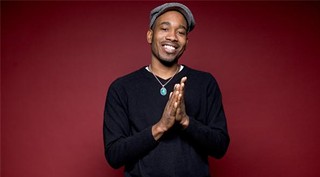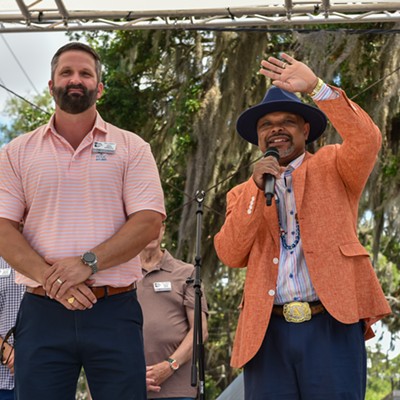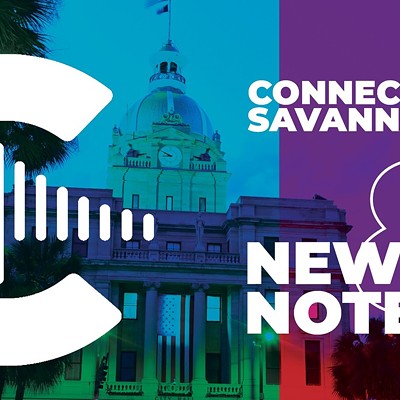Savannah is known as a town of many festivals, most of them with a fairly long pedigree. One of the more recent arrivals, however, may live up to its billing better than just about any of them.
About to begin its third edition, the Savannah Urban Arts Festival over its week–long length — culminating in the grand festival day April 23 — offers a robust, diverse range of entertainment, from music to dance to film to visual art to spoken word, as well as a large educational and recreational component, from workshops to skateboard rallies.
Seriously folks, check out the schedule. This festival is packed with cool stuff to do, much of it free of charge.
“We’re the only festival in the southeast doing what we’re doing,” says organizer DaVena Jordan, well–known locally as a founder and director of AWOL (All Walks of Life), a nonprofit youth advocacy group.
“Our draw has been phenomenal,” Jordan says. “We had people drive from as far away as Charlotte last year.”
While the Savannah Urban Arts Festival — or “SUAF,” as its organizers call it — isn’t directly affiliated with AWOL, the event has many overlapping goals, including keeping youth positively engaged in the arts and “providing kids with opportunity in midst of violence and poverty,” Jordan says.
Another key goal of SUAF is to give local and regional artists a chance to build relationships for future collaboration. Indeed, since SUAF is quite low-budget compared to other local festivals — less than $15,000 for an entire week of programming — that is in a sense part of the payoff for artists.
The slate of entertainment is indeed diverse, but probably the most interesting featured act is Marc Bamuthi Joseph, a California–based artist well–known from appearance on HBO’s Brave New Voices.
His combination of dance, spoken word, hip–hop and theatre is hard to categorize or even describe — which Joseph says is the whole point.
“I’m generally uncomfortable with labels, I think most of us are. I’m a father and an artist,” he says.
“There are times when my work is critically examined by dance critics, and times when it qualifies as literature, and times when it’s theatre. So it’s actually something I’ve struggled with myself, which I think is actually the strength of the work,” Joseph continues.
“I’m definitely a child of hip-hop and an advocate of spoken word. But I’m also a tap dancer and modern dance choreographer,” he says. “So my work touches on themes of fatherhood, masculinity, global hip-hop and the environment. I use verse, contemporary movement and monologue to get at all these things.”
That said, Joseph’s main inspiration comes not from show biz but education.
“I got out of college and got a teaching fellowship for the 10th grade,” he says. “So my pathway into professional performance is through the English classroom.”
As a key portion of his educational outreach, Joseph helped found a national nonprofit similar to Savannah’s AWOL called Youth Speaks. It is that group which organizes the yearly Brave New Voices poetry festival.
“The two things that keep me hungry, so to speak, are the work that I do with teenagers through the Brave New Voices network, and the fact that I have a nine–year–old who is savvy and creative and smart and agile, and I’ve got to keep up with him!”
In Savannah, Joseph will perform a suite of three new plays in verse he’s written, titled “Red, Black and Green.”
“They intersect contemporary movement and spoken word poetry,” he says. “What I’ll perform in Savannah will be a mix of the three pieces that have premiered and toured. And a little bit of a new piece I’m working on.”
Another featured performer – who SUAF attendees will recall from last year – is Grammy–nominated R&B and blues artist Anthony David. He grew up in Savannah, but made a name for himself in Atlanta, where he now lives.
“I like to tell people Savannah’s a home, and Atlanta’s a foundation,” says David. “Atlanta’s got a great scene that’s supported me. I love it just as much as I love Savannah. People say ‘Atlanta’s not L.A., it’s not New York.’ Well, that’s the point.”
David shares his unique vantage point on Savannah and the strides it has made since he left:
“Savannah is interesting, because being as small as it is it has more of an international appeal than people would probably give it credit for. A lot of people really miss that if they’ve never been,” he says.
“I have friends in Atlanta who have never been who are like, ‘Really?’ Then I bring them and they’re like, ‘Whoa, get out of here.’”
As you might expect, Savannah’s cultural life greatly influenced David’s future work.
“I was raised with the gospel influence, in the Baptist church and all that. But hip hop was my music and when I started playing guitar something that interested me was the similarities between blues and hip hop,” David says.
“Blues is in everything, but I was thinking about songs like ‘Crawling Kingsnake’ — that’s just a guy talking shit! That’s what we do in hip–hop! So the blues link is everywhere.”
The focus of SUAF — with its poetry slams and hip–hop themed performances — is clearly directed toward a younger demographic than most festivals in town, and just as clearly directed toward a more racially diverse crowd as well.
However, Jordan rejects the typical euphemism of “urban” as meaning “African American.”
“We grappled with that originally, as a group,” she says.
But her epiphany came when she went to a similar event elsewhere, also called an “urban arts festival,” where she saw things as diverse as glass–blowing workshops and performances of honky–tonk music.
“So in the end we decided that it doesn’t have to mean that, and so we’re not going to let it mean that,” Jordan says.
Marc Bamuthi Joseph agrees.
“The word ‘urban’ is very useful, but at the tip of the wrong pen it absolutely is a euphemism for color,” he says.
“Urban art isn’t so much about race as it is about aesthetic. Most urban centers are broader in terms of access and acceptance, and pushing away from antiquated cultural norms.”
Anthony David was more blunt:
“What happened was some idiot — or somebody I wouldn’t necessarily agree with— found a way to make ‘urban’ mean ‘black.’ Well, we’re powerful enough to take it back the other way,” he says.
“People say this means that, that means this. Well, it means that because that person made you think that,” David says, pointing out that Hindus used the swastika as a symbol of peace for thousands of years before Hitler used it as a symbol of hate.
Thursday 4/21
Anthony David Concert at Muse Arts Warehouse, Doors 7pm, Concert-8pm, $20 ticket donation
Friday 4/22
SUAF Artist Advocacy: Giving Artist a Voice-3:30-5:00pm at 15 West York St.
Spoken Dance-6-8:30pm at The Telfair Academy, 121 Barnard St.
Friday Night Jam Session-9pm-1am, at Second Line, 306 W Upper Factors Walk
Saturday 4/23
Woody's Skate Park present SUAF Skate!-12-3pm, 218 Windsor Road
"SUAFest DAY" - 4-11PM at Muse Arts Warehouse, 703 D Lousiville Road including ‘Shut Up and Fight' Macon vs. Savannah
Sunday 4/24
Vinyl Appreciation's Official 1-Year Anniversary-5pm-10pm at Muse Arts Warehouse
Dope Sandwich presents The After-After-After Party -11pm-2am at Molly McPhersons Bar, 311 West Congress St.

































